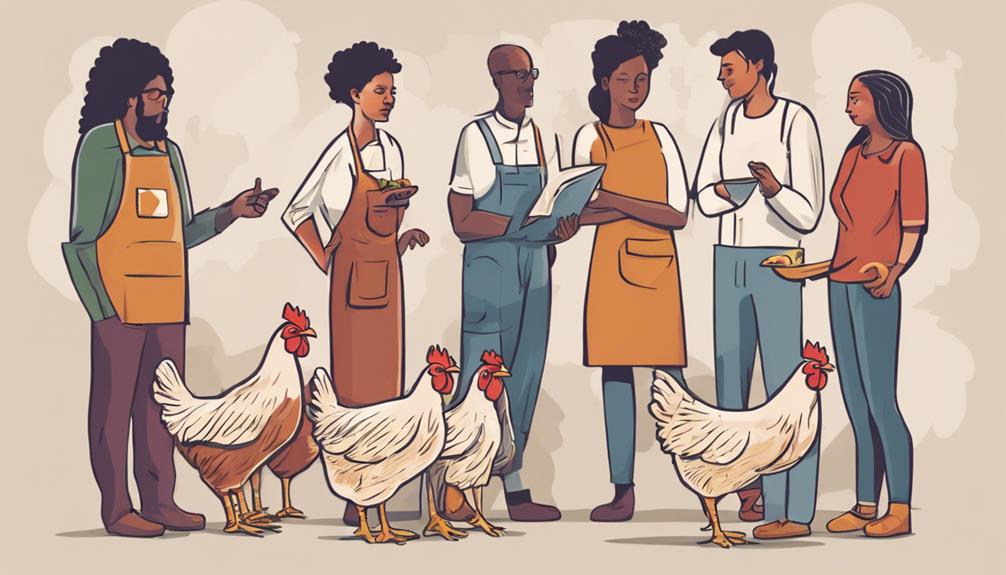Top Tips for Navigating Chicken Animal Rights Debates"
When engaging in chicken animal rights debates, remember to prioritize compassion and understanding. Start by educating yourself on chicken welfare basics like access to clean water and nutritious food. Debunk common misconceptions surrounding chicken intelligence and hygiene needs. Consider ethical farming practices, ensuring stress-free environments and space for natural behaviors. Advocate for proper housing to promote health and safety. Highlight the negative impact of factory farming on the environment and chicken well-being. Make ethical consumer choices by supporting humane products. Engage in constructive dialogues by listening actively and respectfully. Begin your journey towards informed discussions with these tips.
Understanding Chicken Welfare Basics
Have you ever wondered how chickens' welfare is essential for their overall well-being and happiness? Understanding and meeting their basic needs is crucial to ensure they lead healthy and fulfilling lives. When it comes to chicken welfare standards, there are key factors to consider to provide them with optimal care.
Chickens have basic needs that must be met to ensure their welfare. These include access to clean water, nutritious food, and suitable living conditions. Providing a comfortable and safe environment is essential for their physical and mental well-being. Adequate space to move around freely, proper ventilation, and protection from extreme weather conditions are all vital aspects of meeting their basic needs.
Meeting welfare standards for chickens goes beyond just fulfilling their physical requirements. Chickens are social animals that thrive in the company of their flock. Providing opportunities for social interactions, such as roosting together and engaging in natural behaviors like dust bathing, is crucial for their mental stimulation and overall happiness.
Debunking Common Misconceptions
To truly understand and advocate for chicken welfare, it's important to address and correct common misconceptions surrounding their care and needs. Debunking myths is crucial in ensuring that chickens are treated with the compassion and respect they deserve.
One common misconception is that chickens are unintelligent animals. In reality, chickens are intelligent creatures with problem-solving skills and the ability to form complex social structures within their flocks. By acknowledging their intelligence, we can better appreciate their needs and behaviors.
Another prevalent myth is that chickens are dirty animals. While they do engage in dust bathing to keep clean, chickens are naturally inclined to maintain a level of hygiene in their environment. Providing them with proper housing and space allows them to exhibit their natural behaviors and stay clean.
Addressing concerns about chicken health is also essential. Some believe that chickens need constant antibiotic treatment to stay healthy. However, with appropriate living conditions, access to clean water, and a balanced diet, chickens can thrive without the routine use of antibiotics. It's important to promote sustainable farming practices that prioritize the well-being of the chickens and the consumers they serve.
Ethical Considerations in Chicken Farming
When considering ethical considerations in chicken farming, it's crucial to prioritize the well-being and humane treatment of these sentient beings throughout every aspect of their care and management. Ethical farming practices are essential to ensure the highest standards of animal welfare are met. This involves providing chickens with proper housing, access to clean water and nutritious food, and medical care when needed.
In ethical chicken farming, it's imperative to create a stress-free environment that allows chickens to express their natural behaviors. This includes providing enough space for them to move around freely, access to fresh air and natural light, and opportunities for social interactions within their flock. By implementing these practices, you can ensure that the chickens lead healthy and fulfilling lives.
Furthermore, ethical considerations extend to the handling and transportation of chickens. It's crucial to minimize stress during these processes to avoid causing harm or suffering to the birds. Proper training of staff members, comfortable transportation conditions, and humane slaughter practices are all vital components of ethical chicken farming.
Importance of Proper Housing Conditions
Proper housing conditions for chickens are fundamental in ensuring their well-being and health. When chickens are provided with appropriate housing, they're more likely to exhibit natural behaviors, experience less stress, and overall lead happier lives.
Here are three key points emphasizing the importance of proper housing conditions:
- Meeting Housing Standards: Chickens require adequate space to move around, stretch their wings, perch, nest, and dust bathe. Housing should be well-ventilated, free from drafts, and designed to protect them from extreme weather conditions. Providing proper lighting to simulate day and night cycles is also crucial for their well-being.
- Compliance with Welfare Regulations: Adhering to welfare regulations ensures that chickens aren't subjected to overcrowding, poor sanitation, or inhumane conditions. Regulations often outline specific requirements for space per bird, access to food and water, and protection from predators. By following these guidelines, you can help guarantee the chickens are living in humane conditions.
- Promoting Health and Safety: Proper housing conditions contribute significantly to the overall health and safety of the chickens. Clean living spaces reduce the risk of diseases, injuries, and stress-related behaviors. Additionally, well-designed housing can prevent aggression among birds and minimize the occurrence of pecking and other harmful behaviors.
The Impact of Factory Farming Practices
Ensuring the well-being of chickens through proper housing conditions is intricately linked to examining the impact of factory farming practices on these animals. Factory farming, with its focus on maximizing production at minimal cost, often leads to severe environmental consequences. The mass production of chickens in confined spaces results in high levels of waste that can contaminate soil and water sources, contributing to pollution and ecosystem degradation. Additionally, the excessive use of antibiotics in these crowded conditions not only raises concerns about antibiotic resistance in humans but also affects the chickens' health.
The health consequences of factory farming practices extend beyond antibiotic resistance. Chickens raised in overcrowded and unsanitary conditions are more prone to stress, injuries, and diseases. These conditions can compromise the immune system of the birds, making them more susceptible to infections and illnesses. Furthermore, the lack of space for movement and natural behaviors can lead to physical deformities and behavioral issues in chickens.
Advocating for Better Legal Protections
To advocate for better legal protections for chickens, consider the ethical imperative of recognizing their rights and welfare within the existing legal framework. Chickens, like all animals, deserve to be treated with respect and compassion. Here are three ways you can actively support legal reforms and animal advocacy:
- Support Legislative Efforts: Stay informed about proposed laws and regulations aimed at improving the welfare of chickens. Contact your local representatives to express your support for these initiatives. Your voice can make a difference in pushing for legal reforms that protect chickens from cruelty and neglect.
- Join Animal Rights Organizations: Get involved with groups that specialize in animal advocacy, specifically focusing on chickens. These organizations work tirelessly to promote better legal protections for chickens through awareness campaigns, lobbying efforts, and legal challenges. By joining forces with like-minded individuals, you can amplify your impact and contribute to meaningful change.
- Educate Others: Spread awareness about the importance of legal protections for chickens. Share information on social media, engage in discussions with friends and family, and participate in educational events. By raising awareness about the realities chickens face and the need for legal reforms, you can inspire others to join the fight for better treatment of these animals. Together, we can create a more compassionate world for chickens and all living beings.
Promoting Ethical Consumer Choices

Encourage conscious consumer choices by prioritizing products that align with ethical standards for chicken welfare and treatment. When making purchasing decisions, opt for products that come from sources committed to ethical sourcing practices. Look for labels or certifications that indicate the chickens were raised in humane conditions, with access to outdoor spaces, proper nutrition, and without the use of antibiotics or hormones. By choosing ethically sourced chicken products, you're supporting producers who prioritize animal welfare.
Consumer education plays a crucial role in promoting ethical choices. Take the time to research and understand different welfare certifications and labels to make informed decisions. Stay updated on industry practices and trends related to chicken farming and welfare. Share your knowledge with friends and family to expand the impact of your ethical choices. Consider supporting brands and retailers that are transparent about their sourcing practices and demonstrate a commitment to animal welfare.
Engaging in Constructive Dialogue
When engaging in constructive dialogue about chicken animal rights, focus on listening actively and empathetically to different perspectives to foster understanding and collaboration. Active listening involves more than just hearing; it requires fully comprehending the speaker's message and responding thoughtfully. Respectful communication is key to maintaining a productive discussion where all parties feel valued and heard.
Here are three essential tips for engaging in constructive dialogue on chicken animal rights:
- Practice Empathy: Put yourself in the shoes of others to understand their viewpoints better. Empathizing with different perspectives can help bridge gaps and find common ground for meaningful discussions.
- Ask Clarifying Questions: Seek clarification to ensure you grasp the other person's arguments accurately. Clarifying questions demonstrate your interest in understanding their stance and can lead to more insightful conversations.
- Stay Calm and Open-Minded: Emotions can run high in animal rights discussions. Stay calm, composed, and open-minded to facilitate a respectful exchange of ideas. Keeping a level head allows for constructive dialogue without escalating tensions.
Frequently Asked Questions
How Do Chickens Communicate With Each Other?
Chickens communicate with each other in various ways. Roosters crow to establish territory and attract mates, while hens cluck to communicate with their chicks and other flock members. This vocalization helps them express emotions, warn of danger, and maintain social bonds within the group.
Understanding these sounds and body language cues can help you better connect with and care for your feathered friends.
Can Chickens Recognize Their Human Caretakers?
Chickens can recognize their human caretakers due to their impressive cognitive abilities and emotional intelligence. Through social interactions and bonding relationships, they form connections with those who provide their care.
These birds showcase their ability to remember faces and associate them with positive experiences. By nurturing these relationships, you can foster trust and understanding between you and your feathered friends, creating a harmonious environment for both parties involved.
What Role Do Chickens Play in Sustainable Farming?
Chickens play a crucial role in sustainable farming by providing a variety of benefits. Their natural behaviors, like scratching and pecking, help improve soil health and pest control.
Additionally, they can be raised in ways that minimize environmental impact, such as pasture-raised systems. By incorporating chickens into farming practices, you can create a more balanced and eco-friendly agricultural system that benefits both the animals and the environment.
Do Chickens Have Different Personality Traits?
Chickens indeed showcase a range of behavioral differences and emotional responses. Just like people, some chickens are more outgoing and curious, while others may be shy or cautious. They can form bonds with their flock mates and even show signs of distress when separated.
Observing their interactions and reactions can provide valuable insights into the depth of their personalities and emotions. It's fascinating to witness the unique characteristics that each chicken possesses.
Are There Any Chicken-Friendly Food Alternatives?
If you're looking for chicken-friendly food alternatives, consider exploring plant-based options. Not only do these alternatives provide a compassionate choice, but they also have a lower environmental impact compared to traditional animal-based products.
Conclusion
In conclusion, navigating chicken animal rights debates can be complex, but by understanding the basics of chicken welfare, debunking misconceptions, and advocating for better legal protections, you can make a difference.
Remember to consider ethical considerations in chicken farming, promote ethical consumer choices, and engage in constructive dialogue.
By taking these steps, you're actively working towards improving the lives of chickens and promoting a more compassionate world for all animals. Keep up the good work!
